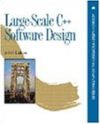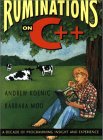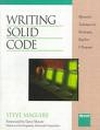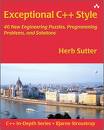Olivier Langlois's blog
Category: C++
01/03/16
C++ in the city in 2016 (0x07E0)
This is an editorial that I sent out to my LinkedIn C++ group members:
https://www.linkedin.com/groups/2035024/2035024-6089655206256144384
I'm discussing the retirement of of one of my favorite C++ books author: Scott Meyers
I am remembering the context when Scott Meyers books were hot and just out of the printers in the 90s. What other books of the same era that did pass as well the test of time.
I'm telling what he was meaning for me as a C++ developer and I am inviting people to discuss the impact and the causes of Mr. Meyers retirement.
Go read about it. It is very good!
05/24/10
Large Scale C++ Software Design
It is a very interesting book. Anyone having been involved in a large scale software development projects will recognize typical problems often seen in this type of projects while reading this book and by experience we have developed an intuition about how to deal with the complexity inherent to large scale projects. Mr Lakos book is the first, to my knowledge, that address this subject and it formalize extremely well the problems of large scale projects and propose a methodology and principles to apply to keep the development and maintainability of these projects manageable. It is a very refreshing C++ book and I recommend it to any C++ professionals not having read it yet.
The most interesting chapters in my opinion are chapter 5 and chapter 6. Chapter 5 presents refactoring methods to remove cyclical dependencies among components, reduce inter dependencies and how to layout components into software layers that will ease reusability and maintainability. Chapter 6 discuss about component insulation. Its difference with encapsulation, the benefits of component insulation and its cost and when it is wise to avoid insulation.
08/22/08
Ruminations on C++
I have got interested in this book because I have read from many sources on Mr. Koenig involvement in several key elements of the C++ language such as argument dependant lookup (ADL), also called the Koenig lookup, and the intersect rule for function overloading. In fact, if you read the book 'The design and evolution of C++', Andrew Koenig name is omni present throughout the book. So I was curious to see what Mr. Koenig had to say on C++.
Reading this book has been like a roller coaster ride. First, the cover is intriguing with its recursive pattern where you can see a girl under a tree in a field with cows in the background reading the 'Ruminations on C++' book with the same cover repeating itself over and over. Then the book is divided into six parts and, in my opinion, not all parts are equally good. The first part is taking a more philosophical view on what the C++ language aims to achieve. This part is not too technical and it has somehow a lot of appeal to my eyes. While reading this part, I was thinking that this was very promising for what was to come.
Then at the second part, it is where things are getting spoiled. Part 2 is describing basic C++ techniques. It is not bad but by having read tons of C++ books, to appreciate one of them, I must find some originality that I haven't found in part 2. This part of the book is average.
Finally, I have changed another time my opinion on the book when I have reached part3. Part3 covers templates and more specifically it recreates the whole though process that the STL designers went through to create STL. I see a lot of value to this kind of activities as I believe that understanding why certain things are done in a certain way can help you to better use those things.
In conclusion, I can recommend this book because I feel that mister Koenig goes beyond just the language syntax and try to teach a though process that someone has to go through to solve programming problems. This is a pedagogical approach not found in every programming book.
10/08/07
Writing Solid Code
This book has been recently recommended to me by Amazon based on my previous purchase habits and I decided to go take a look at its description. At first, I was little bit skeptic about the value of a book published in 1993 and prepared with Word for Windows 2.0 because software programming has changed a lot since then! However, it was a very low risk purchase because of its very low price tag so I decided to give it a try and I have been pleasantly surprised!
This book is the proof that that there are few things in programming that are timeless. Errors of the past still occur today. The programming language used for the examples is C but what is taught is also applicable to C++ programming as well. Topics discussed in the book are: assertions, integrity checks, stepping through code with a debugger, how to not design interfaces that are error prone, avoid language features that are error prone and finally the author conclude his book by describing the attitude that a programmer should have. Among other things, a programmer should prioritize safe code before micro-optimizations. All these concepts are written in a style easy to understand filled with anecdotes that make this book a pleasant read.
To conclude, I have not been blown away by the content of this book but I have learn one thing or two and I am glad that I have read it especially with its very low price tag.
08/01/07
Exceptional C++ Style: 40 New Engineering Puzzles, Programming Problems, and Solutions
By having read the 3 books in the serie, I must say that this is my favorite because it has really answered a lot of small questions I had for a long time about several aspects of C++.
The only thing that I have disliked is that Mr. Sutter has contradicted himself with one of the advice that he was giving in the first book. The advice was to not write an assignment operator in terms of its copy constructor with the in place new operator and the explicit destructor and I did agree with the reasoning. Now in this book, it is written that is ok to use that idiom if and if and if and he goes for about a paragraph to describe the condition where it is ok to use the pattern. I can imagine that the author had to admit that there might be exceptional situation where it is ok to use that technique in a heated debate but my opinion is that out of context, he should not have mention that it might be ok to use that technique without devoting an entire item on that topic. It did just confuse me and I had to reread the item in the first book to convince me that there was effectively a contradiction between the 2 books and that it was not just my memory playing games with me.
:: Next Page >>
Olivier Langlois's blog
I want you to find in this blog informations about C++ programming that I had a hard time to find in the first place on the web.
| Next >
| Sun | Mon | Tue | Wed | Thu | Fri | Sat |
|---|---|---|---|---|---|---|
| << < | > >> | |||||
| 1 | 2 | 3 | 4 | 5 | 6 | |
| 7 | 8 | 9 | 10 | 11 | 12 | 13 |
| 14 | 15 | 16 | 17 | 18 | 19 | 20 |
| 21 | 22 | 23 | 24 | 25 | 26 | 27 |
| 28 | 29 | 30 | ||||
Search

Categories
Olivier Langlois's blog
- AAC (2)
- Book reviews (12)
- C++ (24)
- Code Optimization (4)
- Compiler (3)
- Fractal (2)
- Linux/UNIX (3)
- Multithreading (3)
- Software security (7)
- TCP/IP (8)
- Web (1)
- Windows programming (19)
- C++ (28)
- tutorials (4)
- General (10)
- Hardware reviews (2)
- Linux (12)
- Recommended books (4)
- C++ (20)
- Code Optimization (2)
- Compiler (3)
- Fractal (2)
- Linux/UNIX (1)
- Multithreading (2)
- Rare out of print (3)
- Software security (5)
- TCP/IP (7)
- Windows programming (16)
- Software reviews (0)
- TCP/IP (8)
- Video games (4)
Archives
- January 2016 (1)
- September 2015 (1)
- July 2015 (1)
- June 2015 (1)
- May 2015 (1)
- December 2013 (3)
- September 2013 (1)
- May 2013 (8)
- April 2013 (1)
- December 2010 (1)
- August 2010 (1)
- June 2010 (1)
- More...
Misc
 XML Feeds
XML Feeds
What is RSS?
Who's Online?
- Guest Users: 5
 BOOKS i'm reading
BOOKS i'm reading







